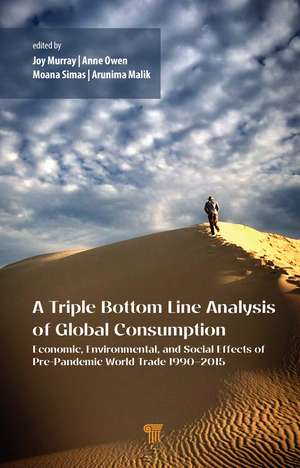A Triple Bottom Line Analysis of Global Consumption: Economic, Environmental, and Social Effects of Pre-Pandemic World Trade 1990–2015
Editat de Joy Murray, Anne Owen, Moana Simas, Arunima Maliken Limba Engleză Hardback – 26 mai 2022
Preț: 809.22 lei
Preț vechi: 889.26 lei
-9% Nou
Puncte Express: 1214
Preț estimativ în valută:
154.86€ • 168.16$ • 130.08£
154.86€ • 168.16$ • 130.08£
Carte disponibilă
Livrare economică 01-15 aprilie
Livrare express 18-22 martie pentru 47.30 lei
Preluare comenzi: 021 569.72.76
Specificații
ISBN-13: 9789814968010
ISBN-10: 9814968013
Pagini: 570
Ilustrații: 23 Tables, black and white; 94 Line drawings, color; 86 Line drawings, black and white; 94 Illustrations, color; 86 Illustrations, black and white
Dimensiuni: 152 x 229 x 34 mm
Greutate: 0.93 kg
Ediția:1
Editura: Jenny Stanford Publishing
Colecția Jenny Stanford Publishing
ISBN-10: 9814968013
Pagini: 570
Ilustrații: 23 Tables, black and white; 94 Line drawings, color; 86 Line drawings, black and white; 94 Illustrations, color; 86 Illustrations, black and white
Dimensiuni: 152 x 229 x 34 mm
Greutate: 0.93 kg
Ediția:1
Editura: Jenny Stanford Publishing
Colecția Jenny Stanford Publishing
Notă biografică
Joy Murray is a senior research fellow with the Integrated Sustainability Analysis (ISA) group at the School of Physics, University of Sydney, Australia. Before joining ISA, Dr. Murray worked for over 25 years in education, preschool to postgraduate. She has also worked with residents of government housing estates to collaboratively develop leadership capacity.
Anne Owen is an academic fellow at the Sustainability Research Institute at the School of Earth and Environment, University of Leeds, UK. Dr. Owen has a background in end-use energy demand and consumption-based energy and carbon accounting using state-of-the-art MRIO databases. She is responsible for constructing the model being used to calculate the UK’s carbon and material footprint—the statistics reported annually by the UK Government.
Moana Simas is a researcher at the Sustainable Energy Technologies group at SINTEF, one of the largest independent research organizations in Europe. She has a background in environmental sciences and energy systems. Her current work focusses on assessing triple bottom line impacts of technology change, climate policies, and circular economy strategies on local and global value chains.
Arunima Malik is an academic at the University of Sydney. She has expertise in undertaking Big-Data modelling of sustainability performance of products, processes, and organisations, and to quantify sustainability impacts at local, national, and global scales. She works closely with the United Nations Sustainable Development Solutions Network for undertaking assessments for quantifying spillover effects in international supply chains.
Anne Owen is an academic fellow at the Sustainability Research Institute at the School of Earth and Environment, University of Leeds, UK. Dr. Owen has a background in end-use energy demand and consumption-based energy and carbon accounting using state-of-the-art MRIO databases. She is responsible for constructing the model being used to calculate the UK’s carbon and material footprint—the statistics reported annually by the UK Government.
Moana Simas is a researcher at the Sustainable Energy Technologies group at SINTEF, one of the largest independent research organizations in Europe. She has a background in environmental sciences and energy systems. Her current work focusses on assessing triple bottom line impacts of technology change, climate policies, and circular economy strategies on local and global value chains.
Arunima Malik is an academic at the University of Sydney. She has expertise in undertaking Big-Data modelling of sustainability performance of products, processes, and organisations, and to quantify sustainability impacts at local, national, and global scales. She works closely with the United Nations Sustainable Development Solutions Network for undertaking assessments for quantifying spillover effects in international supply chains.
Cuprins
Part 1: Introduction 1. A Global Perspective on Sustainable Development 2. Deepening of Global Value Chains 3. Money Cannot Compensate for Entropy: Ecologically Unequal Exchange and the Decoupling of Economics from Reality 4. Is It the End of World (Trade) as We Know It? Changes in Global Trade Patterns after the Outbreak of COVID-19 5. Measuring Impacts in Global Value Chains through Consumption-Based Accounting Part 2: Europe 6. Europe: A Resource-Dependent Region with Strong Sustainability-Oriented Policies 7. European Union: Protecting the Environment while Securing Jobs and Growth 8. Austria 9. Bulgaria 10. France: International Resources for a Sustainable, Inclusive and Innovative future? 11. Germany 12. Italy 13. The Netherlands 14. Norway: Rich + Green = Sustainable? 15. Sweden: An Environmental Success Story 16. The UK: A Proud Leader, or Dishonest User of Statistics? 17. Poland 18. Transition of Slovakia toward a Modern Market Economy 19. Spain Part 3: Africa 20. Africa as Net Exporter of Natural Resources and Pollution 21. South Africa: The Sideways Drift of a Jobless Coal-and-Carbon Nexus 22. Ghana 23. Kenya 24. Morocco 25. Malawi Part 4: The Americas 26. The Americas: On Track toward Sustainable Development? 27. Ecuador: A Traditional Development Path 28. Bolivia 29. Nicaragua: Central America’s Green Lung. But How much Longer? 30. Brazil 31. Colombia 32. Mexico: 20 Years of North American Free-Trade Agreement. Socio-Environmental Trends and Unequal Exchange 33. Argentina: Energy Transition to a Cleaner Economy 34. Chile 35. United States of America Part 5: Asia and Oceania 36. Asia and Oceania: Mutual Outsourcing Partners 37. China 38. Japan 39. Indonesia 40. Russia 41. Australia: The Good, the Bad, and the Ugly 42. New Zealand Part 6: Middle East 43. Middle East: The Dilemma of Oil, Water and Development 44. Iran 45. Iraq
Descriere
This book brings all three pillars of sustainability together into one coherent multiregional input–output (MRIO) framework. It shows the power of MRIO analysis to illuminate the local and global interdependencies of economic, environmental, and social systems and the benefits to be gained through analysing all three together.
